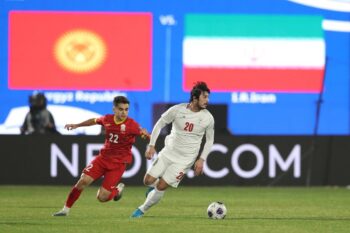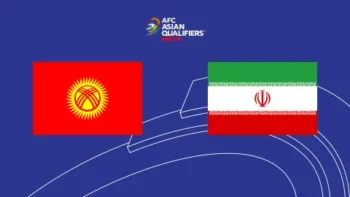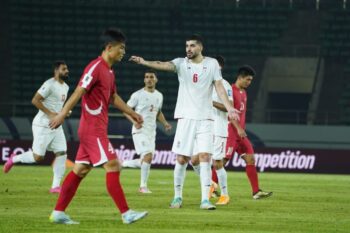Talebi: taking football above politics
 AFC – TEHRAN, In the second of their series of Asian Coaches Year interviews, the-afc.com talks to Jalal Talebi, the coach who plotted Iran’s famous 2-1 victory over the United States at the 1998 FIFA World Cup in France.
AFC – TEHRAN, In the second of their series of Asian Coaches Year interviews, the-afc.com talks to Jalal Talebi, the coach who plotted Iran’s famous 2-1 victory over the United States at the 1998 FIFA World Cup in France.
“Boss, can you give me a few minutes to think about it? It is not an easy decision to take”.
These were Jalal Talebi’s first words when offered the chance to coach Iran at the 1998 FIFA World Cup in France. In the end, it was an offer he could not refuse.
“I asked myself, if not now then when? I had confidence in the potential of the team. He called me again and I just trusted God and said YES,” Talebi told the-afc.com.
“After that I learned that my assignment had the support of Iran President Mohamad Khatami.” In the end, he took the job and went on to preside over probably the most famous result in Iran’s international history – Iran 2 United States 1.
As an Iranian-American, Talebi had to wade through a sea of emotions himself. He recalls his heart racing seconds before the kick-off for the World Cup group match between two countries who shared strained relations in the political arena. Although he has had a long football career, as a player and coach, that single match against USA is what he will be remembered for.
High expectations
And he only had limited time to prepare his team for the tournament, having been given the job three weeks before the World Cup. Expectations in Iran had reached fever pitch but the team were struggling in the lead-up to the event under Yugoslav coach Tomislav Ivic.
Ivic made a promise that the team would perform well during a training camp in Italy before the tournament. However, after a 7-1 loss to AS Roma, a nervous Iran FA lost patience and sacked Ivic.
“Iran FA President Safaei Farahni called me in Italy and said you are my choice now,” said Talebi. “It was in the middle of a crisis and they did not have time to look beyond Iran for a replacement.
” For Iranians, the World Cup, particularly the match against the US, was hugely symbolic. While many tried to shrug it off as just a football game, the political tensions prior to the match was palpable.
Then US President Bill Clinton and Secretary of State Madeline Albright called for fair play in the match, which only served to raise the temperature rather than cool things down.
“To be frank, managing such a crisis was not really part of my skills,” he said.
“Seventy-five million Iranians all over the world, including US citizens, were focusing on us.
“You could never ease the tension. I tried to make my players understand that this was not a political game but how could you make them believe it?”
‘No oxygen’
Iran took a 1-0 half-time lead through Hamid Estili’s header. The players were pumped up at the interval but the anxiety was evident in the dressing room.
“It was as if there was no oxygen in the dressing room,” he said. “It was heavy with tension. The players were happy to be one goal ahead but there was panic and worry on their faces.
“For six months, the global media were playing up this match. I just tried to calm them down and tell them that everything was going well and asked them to concentrate only on the game.”
The second half was memorable, especially the fantastic goal by Mehdi Mahdavikia that gave Iran a 2-0 lead. Team Melli eventually won 2-1 – their first-ever victory in the World Cup finals.
“We were in seventh heaven. We enjoyed listening to the news from Iran and seeing the media reaction everywhere. It was unbelievable.”
Well travelled
Before taking over the national team, Talebi was a well-travelled coach, having worked UAE, Singapore, Indonesia – and Iran. He was also an excellent player in his prime, winning the league with Daraei and finishing as the league’s top goal-scorer when he was 26 years old.
However, just one year later, he was forced to retire because of a knee injury. He said the lack of attention paid to his minisk – a piece of fibro-cartilage inside the knee join – caused the end of his career.
“They did not know what the minisk was,” said the 68-year-old. “My coach gave me hard training and when I went to England for treatment, the doctor said there was nothing left to be fixed. I had no choice but to say goodbye to my playing days.”
But he was determined to stay in football and, from 1971 to 1973, he attended coaching courses at England’s Chelsea FC and Tottehnam Hotspur, and in Brazil. He coached the Iran youth football team from 1975 to 1977 before a six-year spell at UAE’s Al Khalij club.
Singapore stint
In 1996, he managed Geylang United in Singapore and took the team to the S-League title in its first year of existence. Fielding Iranians Mohammad Khakpour and Hamid Estili, he completed the double by winning the Singapore FA Cup.
He then went on to coach the Indonesian Olympic team but, during the political troubles of 1997, he was forced to leave the country.
“They were pretty nice people in football and federation and every thing was going well,” he said. “But suddenly, one night a guy I trusted came to me and said you have to leave the country!
“Everything has changed in the government and it was not safe for me as a foreigner. It was so sad because I did not have even one serious game with my team but I had to say goodbye.”
He returned to Tehran to coach the Bahman club and, after the national team qualified for the 1998 FIFA World Cup, he was chosen by the Iran FA to act as the team’s technical advisor.
Iran qualified for the 1998 finals in dramatic fashion, coming back from two goals down to draw 2-2 against Australia in Melbourne to qualify on away goals. It was their first finals appearance after a 20-year lapse.
Continued success
After the World Cup in 1998, Talebi continued to find success with Iran, winning the WAFF Championship in 2000 in Jordan. He was also in charge of Iran at the AFC Asian Cup in 2000, when they lost by a golden goal to Korea Republic in the quarter-finals.
Talebi then went to Syria to coach Al Jaish before becoming the Syrian national coach, remaining until 2002. He now shares his time between Tehran and Palo Alto in California, where he moved to in 1983.
Occasionally, his mind goes back to that glorious day in France when Iran and the United States were watched by the whole world on a football pitch.
“I am still thinking that winning against US was from God,” he said.




